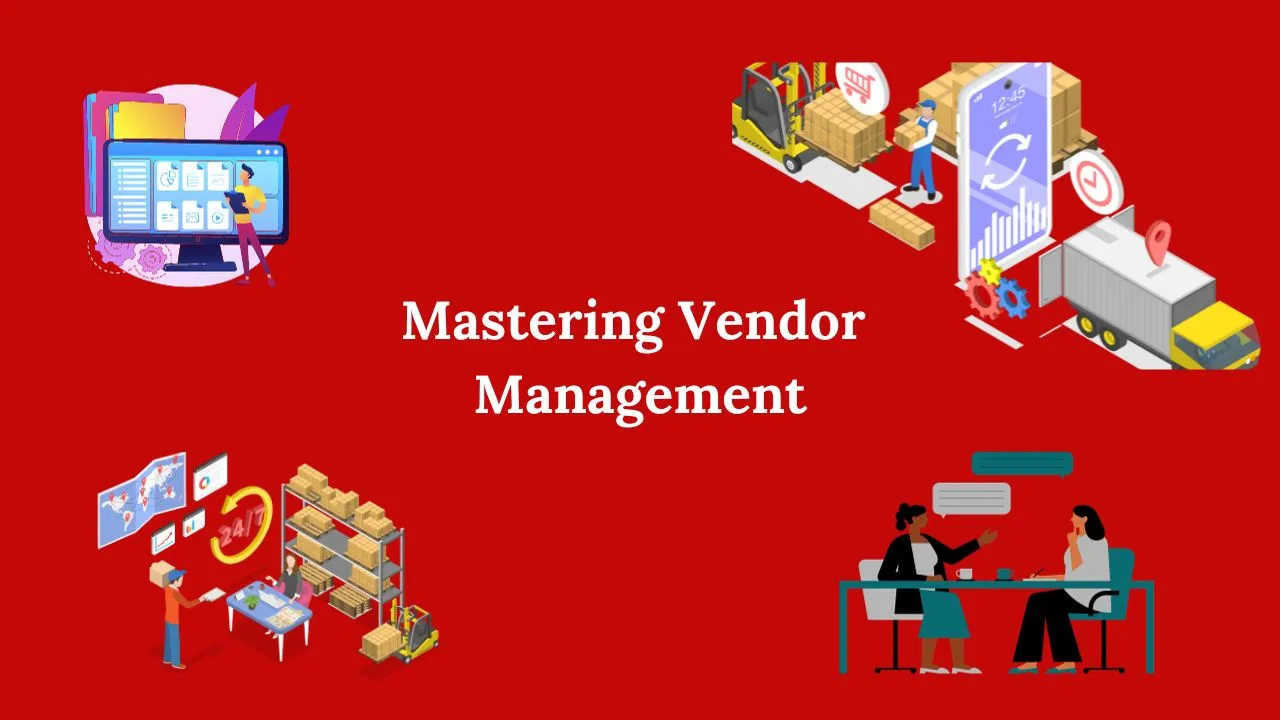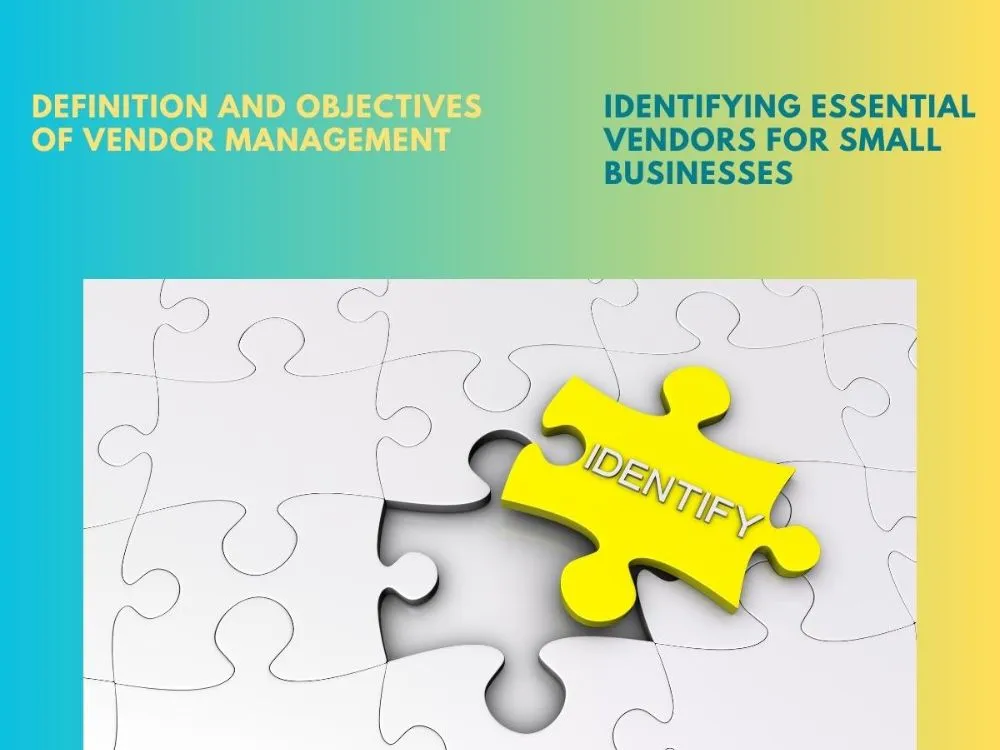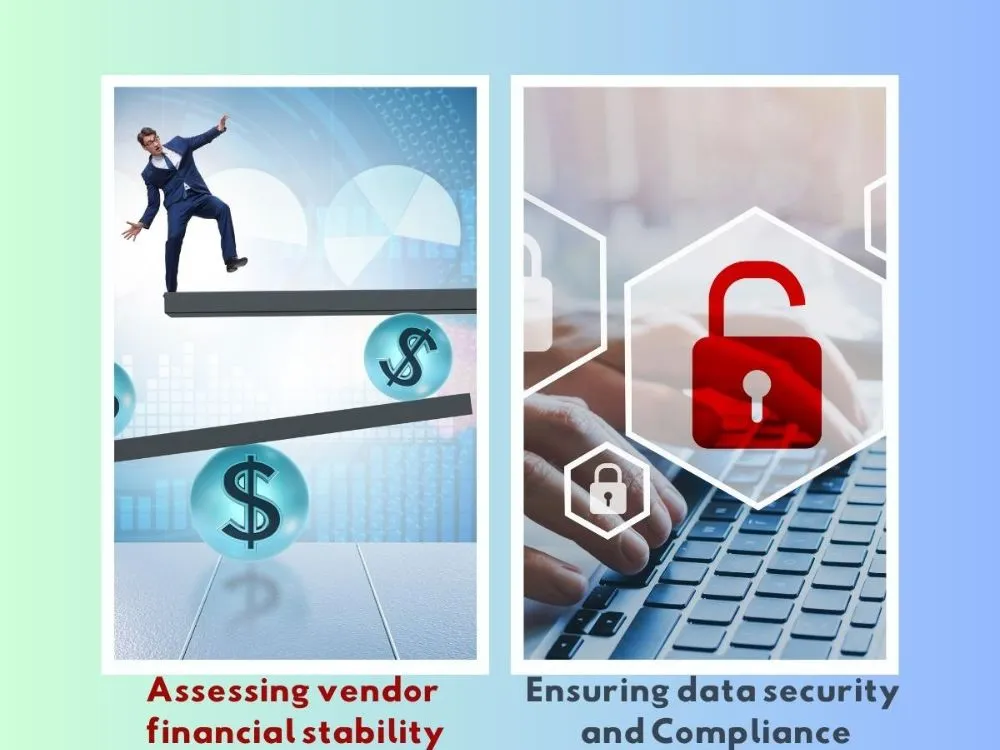
From Frustration to Success: Mastering Vendor Management for Small Businesses
Imagine that your small business is running like a flawlessly functioning system. Orders are on time, quality is top-notch, and your costs are under control. So, what's the secret behind this smooth operation? Well, it's effective vendor management.
Vendor management is more than just a buzzword. It's the strategic process of managing relationships with your external suppliers or vendors. It's essential for the success of small businesses, as it provides a smooth and efficient supply chain.
Effective vendor management lets businesses optimize their costs, enhance quality control, and improve operational performance. By selecting vendors carefully, small businesses can able to align their needs with trustworthy suppliers who deliver the necessary goods or services.
Article Overview
- Understand vendor management: optimize costs, reduce risks, and build strong vendor relationships.
- Learn the essentials: vendor selection, contract negotiation, performance monitoring, and improvement.
- Identify key vendors for small businesses: focus on quality, reliability, pricing, and timely delivery.
- Importance of market research and proposal evaluation: make informed vendor choices.
- Build strong vendor relationships: effective communication, fair contracts, and green practices; mitigate risks with financial checks and data security.
Understanding Vendor Management Basics

Definition and Objectives of Vendor Management
Vendor management is the process of handling the relationship between a business and its vendors. Its objectives include ensuring the availability of high-quality products or services, mitigating risks, optimizing costs, and fostering beneficial relationships.
Effective vendor management simplifies procurement processes, enhances supplier performance, and leads to operational efficiency, cost reduction, increased customer satisfaction, and long-term market sustainability.
Essential tasks in vendor management involve vendor selection, contract negotiation, performance monitoring, and continuous improvement.
Identifying Essential Vendors for Small Businesses
This is one of the crucial aspects of the vendor management process for small businesses. It involves choosing the right suppliers whose products or services are important to the business operations. The vendor identification process begins with analyzing the exact needs and requirements of the business and finding out the types of goods or services that are vital for its smooth functioning.
When selecting essential vendors, small businesses should focus on factors such as product quality, reliability, pricing, and timeliness of delivery. Small businesses secure a continuous supply of important resources and uphold the required quality standards by identifying and partnering with trustworthy vendors.
Effective Vendor Selection Process

Importance of Market Research in Vendor Selection
Conducting market research is crucial in the vendor selection process. It's really helpful to find potential vendors who have a thorough and clean background in delivering the required products or services to the business.
Small businesses must thoroughly research various important factors of the vendors before acquiring their products and services. This includes factors like pricing, reputation, trust factor (credibility), and product & service quality. Businesses can make informed decisions based on various factors like values, market price, and vendor track records.
A good vendor selection process is based on thorough market research, and it helps businesses in multiple ways to select the right vendors or suppliers. Nowadays, different technology tools and software are used for conducting efficient market research of vendors.
Evaluating and Shortlisting Vendor Proposals
Evaluating and shortlisting proposals from multiple vendors is an important step in the vendor selection process. Carefully reviewing and assessing the proposals helps identify the most suitable vendors for the business.
The evaluation and assessment of proposals are based on various factors in the vendor quotation, such as price, timeliness of delivery, service level, quality, capability, and other factors. Small businesses should carefully evaluate these factors to select the correct vendors.
Business firms shouldn't select vendors when they quote cheap prices or vice versa. It's recommended to always weigh down all necessary factors in the vendor proposals, including price. This will help choose the correct and reliable vendor.
Case Study of Utilizing Effective Vendor Management Strategies
By effectively utilizing vendor management strategies such as proper market research, vendor evaluation, regular communication, and utilization of technology tools, small business organizations can enhance their chances of getting suitable services from vendors.
Let's see one such business firm that utilized vendor management strategies to gain competitive advantages:
Company Name: Tech Growth Solutions
Overview:
Tech Growth Solutions is a tech startup company that specializes in software development. It had to face significant challenges in vendor management when it expanded its operations. The company struggled a lot with inconsistent software quality, communication gaps, and fewer resources for development, where their external development partners often missed the deadlines.
Challenges Faced:
As Tech Growth Solutions continued to grow, they took on more projects, and coordinating with their external vendors became increasingly complex. The lack of an effective communication process led to misunderstandings, which resulted in delays and compromised software quality. This was their major challenge and impacted their reputation and client satisfaction.
Vendor Management Strategies Implemented:
To overcome these challenges, Tech Growth Solutions followed a comprehensive vendor management strategy as follows:
- They established a regular communication channel with the vendors that included weekly progress meetings and a dedicated project management platform.
- Performance metrics were defined, and it ensured that all their vendors adhered to quality standards and timelines.
- Additionally, they renegotiated the contracts to include tight deadlines and incentives for meeting or exceeding customer expectations.
Results and Impact:
After the implementation of these vendor management strategies, Tech Growth Solutions was able to find significant positive results. They experienced a 30% reduction in project delivery times, which resulted in increased client satisfaction.
Further, the overall software quality improved, and it led them to face fewer post-launch issues and better overall performance. They also realized some cost savings as the renegotiated contracts allowed for more predictable budgeting.
Testimonials:
The CEO of Tech Growth Solutions, Mr. John Davis remarked, "Implementing effective vendor management strategies was a game-changer for our company. Now our projects are running very smoothly, our clients are very happy, and we've seen a noticeable boost in our bottom line."
Key Takeaways:
The success of Tech Growth Solutions highlights the significance of implementing vendor management strategies for gaining key benefits for the organization. This example illustrates the importance of opting the strategies like vendor evaluation, market research, contract negotiation, regular communication, and many others.
Building Strong Vendor Relationships

The Role of Communication in Vendor Relationships
Open and effective communication is a key element in building a strong relationship with vendors for small businesses. Small business owners should communicate often with their vendors to maintain a good relationship and for mutual understanding.
Both parties should always maintain open and effective communication that shouldn’t involve cheating or lies in the delivery of products or services and cash flows. Clear and effective communication lets both parties minimize disputes and misunderstandings in the supply chain process.
Moreover, it helps improve service delivery on time and eventually leads to work efficiency. Effective communication serves as the foundation for successful vendor partnerships and paves the way for long-term collaboration and mutual growth.
Fostering Green Practices in Vendor Relationships
Nowadays, the relationship of businesses with their vendors isn't limited to exchanging services with mere communication. It's about ensuring sustainable practices through an effective vendor relationship.
The role of effective communication and relationships plays a major part in ensuring sustainability, and here's how it works:
a) Shared Values and Vision:
Effective communication is the basis for collaboration on sustainable practices. It all starts with establishing shared values and a common vision for environmental responsibility. By clearly explaining the commitment to sustainability, businesses seek vendors who align with these principles.
b) Transparent Communication Channels:
It's necessary to create transparent channels of communication to exchange sustainable ideas, find common challenges in sustainability, and ensure successful green practices. Establishing open communication ensures that both parties stay informed about each other's efforts and provide constructive feedback.
c) Joint Goal Setting:
Collaboratively set sustainability goals that are smart (Specific, Measurable, Achievable, Relevant, and Time-bound). These goals are something like reducing carbon footprint, utilizing renewable energy sources, sourcing eco-friendly materials, and so on. Also, regular checks and monitoring of these goals are necessary to track progress and celebrate shared achievements.
d) Knowledge Sharing:
Sharing the essential knowledge between vendors and the business, related to green practices, helps boost environmental sustainability. Small businesses benefit from the expertise of their vendors, and vice versa. This shared learning effectively contributes to the continuous improvement of sustainable initiatives.
e) Innovations in Packaging and Logistics:
When both vendors and businesses collaborate on finding opportunities for innovative approaches to packaging and logistics, it reduces environmental impact. Discuss the possibilities of introducing eco-friendly packaging options, EV (Electric Vehicle) transportation systems, and other practices that align with both parties' commitment to sustainability.
Negotiating Favorable Contracts and Pricing
This negotiation is crucial for building strong vendor relationships where vendors or small business owners shouldn’t be affected by the legal contract or pricing system.
Moreover, it consists of understanding the requirements of both parties and obtaining a mutually beneficial agreement. Obtaining favorable contracts and pricing can significantly benefit small businesses and vendors. Organizations need skillful negotiators for this purpose.
Firms should leverage their strengths by assigning employees who possess strong negotiation skills and extensive experience. Skillful negotiation empowers small businesses to secure favorable contractual terms, competitive pricing, and valuable additional services from the vendor side.
For further insights into enhancing your business capabilities, explore our article on the Top 10 work-related strengths to see how these employee skills strategically benefit in negotiating favorable contracts and strengthen your organization.
Embracing Vendor Diversity
In the vendor management process, negotiating favorable contracts and pricing is a crucial approach for sustainable growth and to reap all the benefits. At the same time, it's equally important to recognize the impact of vendor diversity to encourage a socially responsible business approach.
Embracing diverse suppliers or vendors not only helps in acquiring quality products or services, lower cost, and more innovation for the company, but it also shows a true commitment to social responsibility.
By having a proper engagement with vendors, small businesses adequately contribute to a more inclusive economy and promote equity. Embracing vendor diversity isn't just viewed as a strategic business approach. In addition to that, it's viewed as a crucial step towards building a rigid and more socially conscious enterprise.
Mitigating Risks in Vendor Management

Assessing Vendor Financial Stability
Assessing the financial stability of vendors helps mitigate risks in vendor management. This assessment is important for small business owners to know whether the vendors have the required level of finances to fulfill the product or service delivery without any interruptions or delays.
The assessment involves important identification and evaluation of vendors' present financial statements, credibility, and background verifications to ensure their capability to deliver the required services.
It's very important to select financially stable vendors. So, small businesses can ensure continuous operation without any unnecessary delays or interruptions. Plus, they can safeguard their operation to maintain a reliable supply chain.
Businesses must check whether the vendors can handle their finances. But if the company deals with vendors from various countries, things get a bit tricky. There may be extra challenges the business has to deal with, such as different rules, offshore payments, variations in monetary value, distance, economic ups and downs, etc.
Therefore, it's not just about looking at the vendors' financial stability, but also the business should keep an eye on different factors like distance, regional rules, time difference, and other applicable factors. This approach helps businesses make smart choices in choosing the right vendors, considering the bigger picture of the important factors apart from financial stability.
Ensuring Data Security and Compliance
Data security and compliance management are essential considerations in vendor management to protect sensitive information and adhere to regulatory requirements. Small businesses should assess vendors' data security measures before getting into the contract. This includes encryption protocols, access controls, and vulnerability management.
Verifying vendors' compliance with all relevant data protection laws and industry regulations is important. This involves reviewing certifications, performing audits, and establishing apparent contractual obligations regarding data privacy and security.
Businesses can mitigate the risk of data breaches, reputational damage, and legal penalties by partnering with vendors who prioritize strong data security and compliance practices. Proactive measures in this area effectively safeguard both the business and its customers' information, therefore fostering trust and maintaining regulatory compliance.
Final Thoughts
Vendor management is a vital process for small businesses that enables them to optimize costs, enhance operational performance, and improve customer satisfaction. It involves a careful selection of essential vendors based on various factors like quality, trustworthiness, and quick delivery. So businesses can make sure of a continuous supply of goods and services.
Conducting thorough market research and evaluating vendor proposals helps in making informed decisions. Building strong relationships through open communication and favorable contract negotiations facilitates collaboration and mutual growth among vendors and small business owners.
FAQs
Q1: What is involved in the vendor selection process?
The vendor selection process consists of conducting proper market research, evaluating the vendor proposals, and shortlisting the most appropriate vendors for the business.
Q2: How can I build strong vendor relationships?
To build strong vendor relationships, it must be incorporated with open and effective communication, and negotiating favorable contracts and pricing.
Q3: How can vendor management contribute to business growth?
Vendor management can efficiently contribute to business growth by encouraging collaboration, ensuring timely deliveries, and maximizing operational efficiency.
Q4: What are the key elements of successful vendor partnerships?
Key elements of successful vendor partnerships include open communication, mutual understanding, and mutually beneficial agreements.
Explore Related Articles
https://smarttoolsai.com/post/time-converter-applications-in-global-operations
.webp)